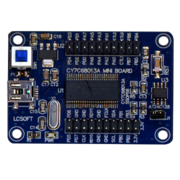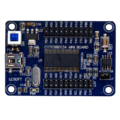Difference between revisions of "Lcsoft Mini Board"
Uwe Hermann (talk | contribs) m (→Resources) |
Uwe Hermann (talk | contribs) m |
||
| Line 14: | Line 14: | ||
}} | }} | ||
The '''Lcsoft CY7C68013A Mini Board''' is a Cypress FX2 eval board, which can be used as USB-based, 16-channel logic analyzer with up to 24MHz sampling rate. | The '''Lcsoft CY7C68013A Mini Board''' is a Cypress FX2(LP) eval board, which can be used as USB-based, 16-channel logic analyzer with up to 24MHz sampling rate. | ||
It is a clone of the [[Saleae Logic]]. | It is a clone of the [[Saleae Logic]]. | ||
| Line 24: | Line 24: | ||
== Hardware == | == Hardware == | ||
* '''Main chip''': Cypress CY7C68013A-56PVXC ( | * '''Main chip''': Cypress CY7C68013A-56PVXC (FX2LP) | ||
* '''3.3V voltage regulator''': Advanced Monolithic Systems ASM1117-3.3 | * '''3.3V voltage regulator''': Advanced Monolithic Systems ASM1117-3.3 | ||
* '''128kB I2C EEPROM''': Atmel AT24C128A | * '''128kB I2C EEPROM''': Atmel AT24C128A | ||
* '''24MHz crystal''': JY24.0000601 | * '''24MHz crystal''': JY24.0000601 | ||
All the pins on the FX2 are broken out to 40 header pins. There's an on/off toggle switch, a reset button, and a jumper that lets you select whether the | All the pins on the FX2(LP) are broken out to 40 header pins. There's an on/off toggle switch, a reset button, and a jumper that lets you select whether the FX2LP gets its configuration from a small EEPROM, or boots into the default mode. The EEPROM's default settings make it come up with the same VID:PID as a [[Saleae Logic]]. | ||
== Photos == | == Photos == | ||
| Line 39: | Line 39: | ||
File:Lcsoft mini board at24c128a.jpg|<small>Atmel AT24C128A</small> | File:Lcsoft mini board at24c128a.jpg|<small>Atmel AT24C128A</small> | ||
File:Lcsoft mini board crystal.jpg|<small>24MHz crystal</small> | File:Lcsoft mini board crystal.jpg|<small>24MHz crystal</small> | ||
File:Lcsoft mini board fx2.jpg|<small>Cypress | File:Lcsoft mini board fx2.jpg|<small>Cypress FX2LP</small> | ||
</gallery> | </gallery> | ||
| Line 60: | Line 60: | ||
'''Do not directly hook the board pins to another circuit, if you don't know what you are doing! This could damage the board!''' | '''Do not directly hook the board pins to another circuit, if you don't know what you are doing! This could damage the board!''' | ||
The simplest circuit would be adding at least resistors in between your circuit-in-test and the Lcsoft board, but be aware here that the Cypress FX2 chip can only tolerate a maximum of 5V I/O. Better would be to use a clamp circuit like shown at [http://sunbizhosting.co.uk/~spiral/blog/?p=117 Spiralbrain's Blog] (but you do not need to add another EEPROM for sigrok with [[fx2lafw]]!). A buffer circuit using a 74HC241 IC for protection is also possible. Check the [[fx2lafw]] page to see which protection circuits are used on other logic analyzer boards. | The simplest circuit would be adding at least resistors in between your circuit-in-test and the Lcsoft board, but be aware here that the Cypress FX2(LP) chip can only tolerate a maximum of 5V I/O. Better would be to use a clamp circuit like shown at [http://sunbizhosting.co.uk/~spiral/blog/?p=117 Spiralbrain's Blog] (but you do not need to add another EEPROM for sigrok with [[fx2lafw]]!). A buffer circuit using a 74HC241 IC for protection is also possible. Check the [[fx2lafw]] page to see which protection circuits are used on other logic analyzer boards. | ||
More information can be found in [[Circuits for barebone boards]]. | More information can be found in [[Circuits for barebone boards]]. | ||
Revision as of 22:22, 16 December 2012
 | |
| Status | supported |
|---|---|
| Source code | fx2lafw |
| Channels | 8/16 |
| Samplerate | 24MHz |
| Samplerate (state) | — |
| Triggers | none (SW-only) |
| Min/max voltage | ? |
| Memory | none |
| Compression | none |
| Website | lctech-inc.com |
The Lcsoft CY7C68013A Mini Board is a Cypress FX2(LP) eval board, which can be used as USB-based, 16-channel logic analyzer with up to 24MHz sampling rate.
It is a clone of the Saleae Logic.
In sigrok, we use the open-source fx2lafw firmware for this logic analyzer.
See Lcsoft Mini Board/Info for some more details (such as lsusb -vvv output) on the device.
Hardware
- Main chip: Cypress CY7C68013A-56PVXC (FX2LP)
- 3.3V voltage regulator: Advanced Monolithic Systems ASM1117-3.3
- 128kB I2C EEPROM: Atmel AT24C128A
- 24MHz crystal: JY24.0000601
All the pins on the FX2(LP) are broken out to 40 header pins. There's an on/off toggle switch, a reset button, and a jumper that lets you select whether the FX2LP gets its configuration from a small EEPROM, or boots into the default mode. The EEPROM's default settings make it come up with the same VID:PID as a Saleae Logic.
Photos
Protocol
Since we use the open-source fx2lafw firmware for this device, we don't need to know the protocol.
Possible Issues
- With some kernel versions, and if the onboard EEPROM is disconnected (the jumper not connected) the kernel will automatically claim the device with a usbtest kernel module, seen in dmesg like usbtest 2-2:1.0: FX2 device — if this happens, sigrok will be unable to claim the device. Remove the usbtest kernel module as root to be able to use it:
$ sudo rmmod usbtest
You can add the usbtest module to a module blacklist permanently, at least in Debian-based distributions found in /etc/modprobe.d/blacklist.conf:
$ sudo sh -c "echo 'blacklist usbtest' >> /etc/modprobe.d/blacklist.conf"
Required Testing Hardware Extensions
Do not directly hook the board pins to another circuit, if you don't know what you are doing! This could damage the board!
The simplest circuit would be adding at least resistors in between your circuit-in-test and the Lcsoft board, but be aware here that the Cypress FX2(LP) chip can only tolerate a maximum of 5V I/O. Better would be to use a clamp circuit like shown at Spiralbrain's Blog (but you do not need to add another EEPROM for sigrok with fx2lafw!). A buffer circuit using a 74HC241 IC for protection is also possible. Check the fx2lafw page to see which protection circuits are used on other logic analyzer boards.
More information can be found in Circuits for barebone boards.





